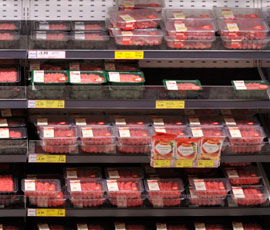Meat and biofuels ‘threaten food security’

Britain should take concerted action to reduce food waste and encourage consumers to eat less meat, the government has been told.
MPs on the International Development Committee (IDC) said action was needed to curb food wastage in the UK and as part of wider efforts to improve global food security.
With the UK never more than a few days away from a significant food shortage, consumers should also be “encouraged over time” to reduce how often they eat meat.
The MPs also hit out at biofuels, warning that growing crops for fuel takes up land that could be growing food.
The warnings are contained in an IDC report on global food security, launched as world leaders prepare to assemble in London to attend an international nutrition summit.
Committee chairman Malcolm Bruce said: “There is no room for complacency about food security over the coming decades if UK consumers are to enjoy stable supplies and reasonable food prices.”
UK aid to help smallholders increase food production in the developing world would help keep a lid on rising world food prices, which threaten to reduce the living standards of UK consumers.
“We have seen two notable ‘shocks’ or ‘spikes’ in global food prices over recent years, with price peaks in June 2008 and February 2011,” said Sir Malcolm.
“These crises – driven by rising demand for food and by the impact of biofuels produced through agriculture – hurt many parts of the UK food industry and strongly undermined the global fight against hunger.”
Under the umbrella of its G8 presidency, the government is hosting a special event – Nutrition for Growth: Beating hunger through nutrition and science – in London on 8 June.
It will be attended by members of the G8 New Alliance for Food Security and Nutrition, which includes G8 countries, developing country governments and private companies.
Sir Malcolm said a number of tangible measures set out in the report could have a significant impact on global food security and directly benefit UK consumers.
“There is, for example, considerable scope for the government to launch a national consumer campaign to reduce domestic food waste.”
Alongside this, the government should set national targets to curb food waste within the UK food production and retail sectors, with clear sanctions for companies that failed to meet these targets.
“With the UK never more than a few days away from a significant food shortage, UK consumers should also be encouraged over time to reduce how often they eat meat,” said Sir Malcolm.
At the same time, the UK should place a stronger focus on more sustainable extensive systems of meat production such as pasture-fed cattle, rather than on highly intensive grain-fed livestock units.
With respect to biofuels, MPs acknowledge that agriculturally-produced biofuels are having a major detrimental impact on global food security by driving higher and more volatile food prices.
They confirm that EU targets requiring 10% of transport energy to be drawn from renewable sources by 2020 are likely to cause dramatic food price increases.
Responding to this, the committee called on the UK government to revise its domestic Renewable Transport Fuel Obligation (RTFO) to specifically exclude agriculturally-produced biofuels.
It also called on the UK ministers to push for similar reform of the EU target.
Sir Malcolm said: “Biofuel crops not only displace food crops but are in some cases providing energy sources that are potentially more damaging to the environment than fossil fuels.
“So while we recognise that refining the RTFO will make it harder for the UK to meet current EU obligations, the relevant target does not kick in until 2020 so there is nothing to stop the UK from revising the RTFO now to exclude agriculturally-produced biofuels.”
Responding to the report, NFU chief livestock adviser Peter Garbutt said: “The NFU believes that eating lean red meat has an important role to play in a healthy balanced diet. It’s a traditional part of the British lifestyle and is enjoyed by most of the population.
“A number of scientific and medical studies down the years have also agreed that red meat is beneficial to health and provides the body with a ready source of essential vitamins and minerals. Cutting out red meat altogether can have adverse health effects, particularly for those at risk of having a poor iron intake.”
“The UK livestock sector plays a crucial role in sustaining some of the nation’s most beautiful and treasured landscapes as well as being the bedrock of rural communities. Almost 60% of farming’s uplands, which is dominated by livestock, is designated as National Park or areas of natural beauty.
“More than two-thirds of the UK’s agricultural area is made up of grassland. The reality is that if red meat consumption falls dramatically there would be a very real risk of the most valuable environmental assets being abandoned, and we would see lowland grasslands switched to arable production.”
